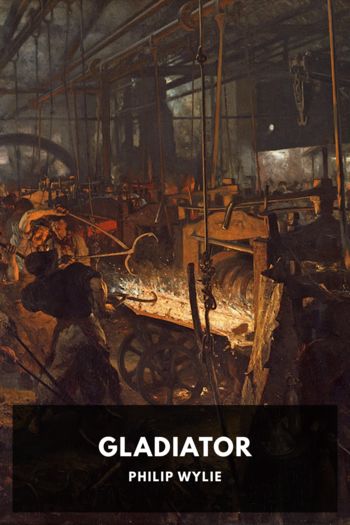Gladiator - Philip Wylie (readnow .TXT) 📗

- Author: Philip Wylie
Book online «Gladiator - Philip Wylie (readnow .TXT) 📗». Author Philip Wylie
The words had been wrung from Hugo. Perspiration trickled down his face. He bit his lips to check himself. The older man was grave. “All your emotions, your reflections, your yearnings and passions, come—to that. And yet—”
“Look at me in another light,” Hugo went on. “I’ve tried to give you an inkling of it. You were the first who saw what I could do—glimpsed a fraction of it, rather—and into whose face did not come fear, loathing, even hate. Try to live with a sense of that. I can remember almost back to the cradle that same thing. First it was envy and jealousy. Then, as I grew stronger, it was fear, alarm, and the thing that comes from fear—hatred. That is another and perhaps a greater obstacle. If I found something to do, the whole universe would be against me. These little people! Can you imagine what it is to be me and to look at people? A crowd at a ball game? A parade? Can you?”
“Great God,” the scientist breathed.
“When I see them for what they are, and when they exert the tremendous bulk of their united detestation and denial against me, when I feel rage rising inside myself—can you conceive—?”
“That’s enough. I don’t want to try to think. Not of that. I—”
“Shall I walk to my grave afraid that I shall let go of myself, searching everywhere for something to absorb my energy? Shall I?”
“No.”
The professor spoke with a firm concentration. Hugo arrested himself. “Then what?”
“Did it ever dawn on you that you had missed your purpose entirely?”
The words were like cold water to Hugo. He pulled himself together with a physical effort and replied: “You mean—that I have not guessed it so far?”
“Precisely.”
“It never occurred to me. Not that I had missed it entirely.”
“You have.”
“Then, for the love of God, what is it?”
Hardin smiled a gentle, wise smile. “Easy there. I’ll tell you. And listen well, Hugo, because tonight I feel inspired. The reason you have missed it is simple. You’ve tried to do everything single-handed—”
“On the contrary. Every kind of assistance I have enlisted has failed me utterly.”
“Except one kind.”
“Science?”
“No. Your own kind, Hugo.”
The words did not convey their meaning for several seconds. Then Hugo gasped. “You mean—other men like me?”
“Exactly. Other men like you. Not one or two. Scores, hundreds. And women. All picked with the utmost care. Eugenic offspring. Cultivated and reared in secret by a society for the purpose. Not necessarily your children, but the children of the best parents. Perfect bodies, intellectual minds, your strength. Don’t you see it, Hugo? You are not the reformer of the old world. You are the beginning of the new. We begin with a thousand of you. Living by yourselves and multiplying, you produce your own arts and industries and ideals. The new Titans! Then—slowly—you dominate the world. Conquer and stamp out all these things to which you and I and all men of intelligence object. In the end—you are alone and supreme.”
Hugo groaned. “To make a thousand men live my life—”
“But they will not. Suppose you had been proud of your strength. Suppose you had not been compelled to keep it a secret. Suppose you could have found glorious uses for it from childhood—”
“In the mountains,” Hugo whispered, his eyes bemused, “where the sun is warm and the days long—these children growing. Even here, in this place—”
“So I thought. Don’t you see, Hugo?”
“Yes, I see. At last, thank God, I do see!”
For a long time their thoughts ran wild. When they cooled, it was to formulate plans. A child taken here. Another there. A city in the jungle—the jungle had harboured races before: not only these Mayas, but the Incas, Khmers, and others. A modern city for dwellings, and these tremendous ruins would be the blocks for the nursery. They would teach them art and architecture—and science. Engineering, medicine—their own, undiscovered medicine—the new Titans, the sons of dawn—so ran their inspired imaginations.
When the night was far advanced and the camp was wrapped in slumber, they made a truce with this divine fire. They shook each other’s hands.
“Good night, Hugo. And tomorrow we’ll go over the notes.”
“I’ll bring them.”
“Till evening, then.”
Hugo lay on his bed, more ecstatic than he had ever been in his life. By and by he slept. Then, as if the ghosts of Uctotol had risen, his mind was troubled by a host, a pageant of dreams. He turned in his sleep, rending his blankets. He moaned and mumbled. When he woke, he understood that his soul had undergone another of its diametric inversions. The mad fancies of the night before had died and memory could not rekindle them. Little dreads had goaded away their brightness. Conscience was bickering inside him. Humanity was content; it would hate his new race. And the new race, being itself human, might grow top-heavy with power. If his theory about the great builders of the past was true, then perhaps this incubus would explain why the past was no more. If his Titans disagreed and made war on each other—surely that would end the earth. He quailed.
Overcome by a desire to think more about this giants’ scheme, he avoided Hardin. In the siesta hour he went back to his tent and procured the books wherein his





Comments (0)